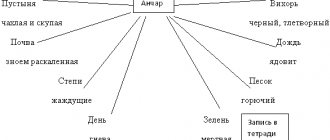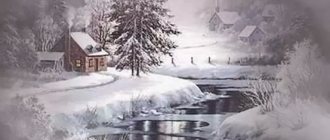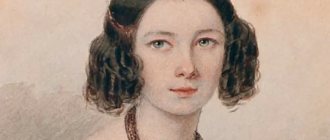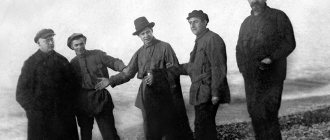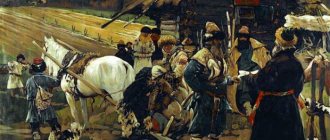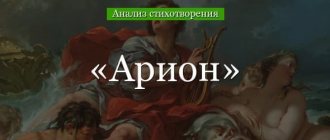History of creation
Alexander Sergeevich began writing the poem “Village” in 1819 , while still very young.
Then he was in Mikhailovsky, his mother’s family estate, where he observed a double picture. On the one hand, pastoral solitude, fields, natural beauty. On the other hand, backbreaking peasant labor, the shameful yoke of slavery. The author’s experiences, feelings, and sincere indignation were reflected in the work.
It was published only in 1826 , and then only the first, “landscape” part, slightly corrected.
The full version appeared before the public only in 1829 . The author indicated another title: “Solitude,” and “Village,” which is more familiar to the modern reader, appeared later.
What the poet denounced
At that time, the poet was working on creating the poem “Ruslan and Lyudmila,” which he began during his studies at the Tsarskoye Selo Lyceum. But, finally being free after six years of study, the poet begins to write about “holy liberty.” And he called his first work, belonging to the genre of ode, “Liberty.” In it he condemned tyrants who disregard the laws. And in the work “Village,” which was written two years later, the great Russian poet angrily condemns serfdom.
Continuing the analysis of Pushkin’s “Village”, we can point out that this work is a socio-political monologue. It touches on those social problems that deeply concerned the author. According to his convictions, Pushkin was a supporter of a constitutional monarchy, while he denounced serfdom, pointing out that the liberation of people should have happened at the behest of the ruler. During the poet's lifetime, only the first part of the work was published. The second was distributed only in lists. The entire poem was published by Herzen abroad in 1856, and in Russia in 1870.
Subjects
In the poem we see a mixture of various topics.
of beautiful nature here . The author eloquently paints peaceful landscapes and confesses his love for rural solitude, silence, creating an atmosphere ideal for reflection, leisurely reflection.
Against this background, the theme of the enslavement of the people, lordly tyranny and lawlessness in relation to the serfs appears especially scary and alien.
Idea
Pushkin wrote this poem to paint rural life in bright colors, to reflect the slowly flowing time, but at the same time to draw attention to a pressing social issue.
Only six years later, in the winter of 1825, the Decembrists would come to Senate Square to demand the abolition of serfdom. Pushkin raised this topic in his literary work much earlier.
The young poet was largely influenced by the views of socio-political secret societies and circles, which he joined while still studying at the Lyceum. In this sense, Pushkin can safely be called the voice of the progressive youth of his time.
Essay on the topic Pushkin village
The poem “Village” belongs to Pushkin’s early works and is an example of the poet’s freedom-loving lyrics. After graduating from the Lyceum, young Pushkin settled with his parents in a house on Fontanka and plunged headlong into the bustling life of the capital. Everything was interesting to the young poet: balls, friendly gatherings, theater and, of course, poetry. Pushkin’s poems of that time contain youth, love, friendship and ideas of freedom. He is the author of the ode “Liberty”, the author of accusatory epigrams. Already in the first years, Pushkin’s fame as a singer of freedom and an opponent of autocracy was established. To take a break from the bustle of metropolitan life, which very soon began to weigh down the poet, “in the bosom of peaceful silence,” Pushkin in the summer The second part of the poem simultaneously continues the first and opposes it in thought and the nature of the paintings. Elegy here gives way to harsh satire. In the second part, Pushkin points out the abnormality of existing serfdom, its inhuman nature. The poet’s thoughts here are close to the thoughts of the Decembrists. The poem “Village” ends with the words of a man who despairs of ever waiting for the peasants to be delivered from serfdom. They contain both hope and hopeless bitterness; I'll see, oh friends! An unoppressed people, And slavery that fell due to the king's mania, And over the fatherland of enlightened freedom Will a beautiful dawn finally rise?
Pathos
The poem communicates conflicting emotions.
On the one hand - peace, enjoyment of peaceful landscapes, tranquility and a feeling of quiet happiness in the lap of nature.
On the other hand, despair, impotent malice, anger, all those negative feelings that the lordly attitude towards serfs causes.
In general, “The Village” is one large, detailed, masterfully executed antithesis. In it, the reader sees a clear contrast between the beautiful world in which the peasants live and their unbearable existence.
This is how romanticism and realism collide in Pushkin’s work.
Sublime and revealing work
Pushkin's work is full of accusatory pathos, Old Slavonic terms, as well as ancient images (the influence of classicism is evident here). There are also a lot of solemn, pompous phrases in it. After the first part of the work was published, Emperor Alexander I ordered gratitude to the poet, and after the distribution of the second, he exiled the great poet to the south of Russia. When analyzing Pushkin’s “Village,” we can mention one of the most interesting features of the poem. This is his composition - the poet uses the technique of genre displacement. The first part is more like a sentimental pastoral, the second is closer to a political pamphlet.
Image system
The author builds his work on a clear opposition, which is reflected in the system of images.
First, a rural landscape appears before the mind's eye of the admiring reader . Natural beauty, peace and tranquility reign here.
Against this background, the reality of serfdom looks especially ugly:
Not seeing the tears, not heeding the groan, chosen by fate for the destruction of people, Here the wild nobility, without feeling, without law, Appropriated with a violent vine And the work, and the property, and the time of the farmer.
It is as if the reader receives a slap in the face that is impossible to shrug off. His eyes open, and the effect of such a sharp transition is amazing: few people will not think about the question raised by Pushkin, few will not pay attention.
This is exactly how brilliant literature works: the poet becomes a prophet, the voice of the people, a conductor of truth and righteousness. Drawing vivid artistic images, he achieves incredible strength and power of words.
Nobility appears as something wild, terrible, terrifying. It dominates the peasants, making their life unbearable.
Composition
The composition is clearly two-part; it can conditionally be called a mirror one.
In the first part , the poet paints beautiful landscapes and enjoys the silence and simplicity of village life. He uses beautiful epithets and many adjectives. A static picture is created in which time seems to have stood still: meadows, fields, oak groves, “idle liberty.”
The second part is given in sharp, furious lexical constructions. Pushkin depicts the unbearable life of serfs, their enslavement by tyrant nobles.
An incredibly lively, strong “distorting mirror” effect is created: the beautiful world is reflected by its terrible side, which the reader can no longer brush aside, it is so vividly and sharply presented.
Using such a contrast, Pushkin brilliantly embodies the goal of any oratorical work: to draw attention to an existing problem and push to action, to evoke the right feelings in listeners.
The king's dissatisfaction
Why did the wrath of the tsar, who defeated Napoleonic army and in whose honor the famous “Alexandria Pillar” stood on Palace Square, fall? The reason was the freedom-loving works of the poet. The Tsar once even reproached the then head of the Lyceum, E. A. Engelhardt, for the fact that his graduate “flooded Russia with his outrageous works.” Pushkin was not a member of any secret society, of which there were many at that time. After all, his character was too unpredictable and hot-tempered for that. However, it turned out that for just one poem, in which the great Russian poet freely expressed his thoughts, he was exiled to the south. After all, it was this work that was imbued with hopes that great reforms could await the country.
Artistic originality of the work
The language of the work is precise, expressive, and emotional.
Drawing secluded landscapes, the author uses many adjectives and nouns, thereby creating a calm picture of rural peace.
But in the second part the vocabulary changes dramatically. Words with a pronounced negative meaning appear (“slavery,” “ignorance,” “murderous shame”).
In addition, the language is filled with verbs, and the reader is presented with a completely different, dynamic picture of the torture of the people, occurring with the connivance of the ruling power.
Means of artistic expression
Pushkin used many epithets: “invisible stream”, “vicious courtyard”, “peaceful noise”, etc.
There are many personifications: “I greet you, deserted corner,” “wild nobility, without feeling, without law, has appropriated it to itself with a violent vine,” “skinny slavery is dragged along the reins.”
In addition, the text is filled with metaphors: “a haven of peace, work and inspiration”, “a bosom of happiness and oblivion”.
In general, the entire text is built on the device of antithesis: the opposition of beautiful nature and terrifying lordship.
Analysis of the poem “Village” by Pushkin, version 2
The village atmosphere gave peace to the soul of A.S. Pushkin, at the same time the poet was oppressed by the lack of rights of the peasants. These mixed feelings are reflected in the poem that will be discussed in the article. Schoolchildren study it in 9th grade. We invite you to familiarize yourself with a brief analysis of the “Village” plan.
Brief Analysis
History of creation - the poet began working on the poem in 1819 in Mikhailovsky, and completed it in St. Petersburg. The Village was published only in 1826 under the title Solitude.
The theme of the poem is the beauty of rural nature and the oppression of the people. Composition - The analyzed work is a monologue of the lyrical hero, which is divided into two parts, contrasting in mood: an appeal to rural nature - a story about the lack of rights of peasants. The poem consists of five stanzas with varying numbers of lines. The meter of the poem is iambic hexameter; all types of rhyme are used in the work. Genre : elegy. Metaphors - “a haven of peace, work and inspiration” (about the village), “a bosom of happiness and oblivion”, “the lordship... appropriated to itself with a violent vine the labor, property, and time of the farmer.” Epithets - “luxurious feasts”, “dark garden”, “fragrant stacks”, “azure plains”, “striped fields”, “stately solitude”, “winged mills”, “insensitive whim”.
History of creation
At the beginning of the 19th century, the peasant question was actively discussed in Russia. The authorities received information about the circumstances of the lives of ordinary people, literature was replenished with works revealing the problem of oppression of peasants, and censorship strengthened supervision. In such conditions, in 1819, the poem “Village” appeared.
Alexander Sergeevich began working on the work in Mikhailovsky. Its original version fell into the hands of Alexander I. The Emperor spoke positively about the poems and even expressed gratitude to the young poet. But at this time Pushkin did not publish “The Village”. In 1825, after the Decembrist uprising, censorship control increased. The poem had to be edited in order to be published. The first part of the text, with corrections, was published in 1826 under the title “Solitude.” The full text was seen by the world only in 1829. The name “Village” was used in later publications.
Subject
In the work, the author reveals two themes: the village atmosphere and the oppression of the peasants. Contrasting in mood, they complement each other and give each other expressiveness. Both problems are conveyed through the prism of the perception of the lyrical hero.
The first four stanzas of the poem are devoted to the rural atmosphere. They depict beautiful landscapes and display the emotions of the lyrical “I”. The hero turns to the “deserted corner”, enjoying its tranquility. He admits that for the sake of these sensations he left fun and feasts. Here he feels how thoughts themselves are born in his head.
Next, the lyrical hero recreates free landscapes. The peculiarity of nature paintings is that with their help they express “love” for the village atmosphere. Landscape sketches are very colorful. They cover everything: meadows with stacks, streams, lakes, hills and fields. In the distance, the lyrical hero sees herds, huts and mills. The paintings of nature exude calm, but at the same time they are dynamic. In the fourth stanza, the lyrical hero says that the bosom of nature is the best place for creativity.
After the idyllic pictures, lines appear expressing the depressed state of the lyrical hero. The thing is that landscapes are just a beautiful shell, the reverse of which is the unhappy life of the peasants. Nobility made it possible to take everything from people: labor, time, property. Alexander Sergeevich openly says that all this was done illegally, by force. In the last lines, the lyrical hero expresses the hope that one day the people will be freed.
Composition
In terms of meaning, the poem is divided into two parts: the lyrical hero’s address to the village, including landscape sketches and a story about the life of the people. The formal composition does not correspond to the semantic one. The poem consists of five quatrains, each of which continues the previous one.
More on the topic: Alexander Pushkin ~ Evgeny Onegin. Chapter Four
The poetic meter is iambic hexameter. A. S. Pushkin used all types of rhyme: cross ABAB, ring ABBA and paired AABB.
Genre
The genre of the work is elegy. The author describes the landscapes, intertwining them with sad thoughts about the fate of the common people. The last lines clearly show disappointment and sadness. Not only the reflections of the lyrical hero about the lack of rights of peasants, but also the descriptions of nature are filled with sadness.
Means of expression
In the work, the poet uses means of expression . With their help, he creates a panoramic picture of the village, conveys the emotions that overwhelm the lyrical hero.
are often found in the text : “a haven of peace, work and inspiration” (about the village), “a bosom of happiness and oblivion”, “the lordship... appropriated to itself with a violent vine the labor, property, and time of the farmer.”
Landscapes and reflections are supplemented with epithets - “luxurious feasts”, “dark garden”, “fragrant stacks”, “azure plains”, “striped fields”, “stately solitude”, “winged mills”, “insensible whim”, “exhausted slaves” .


